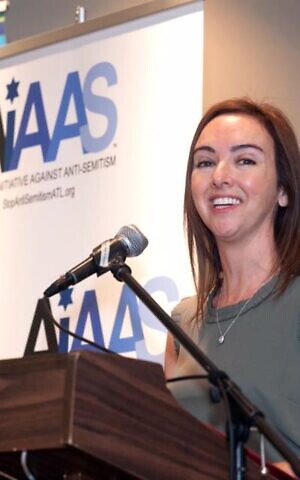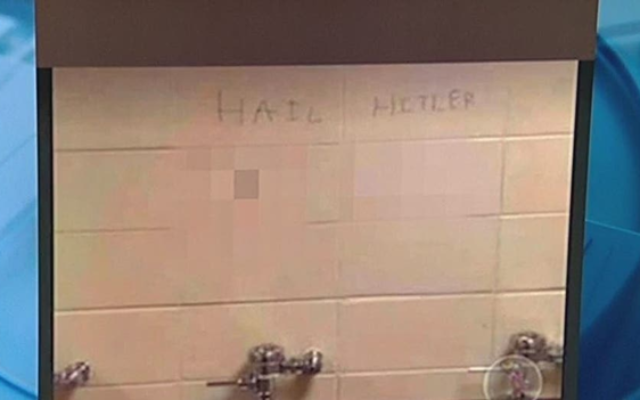Rabbi Expresses Optimism for Cobb Schools
Meetings with the Cobb Board of Education expected to have good results.

Two weeks after the Cobb County Board of Education heard criticism from several high school students, parents and community leaders for its lackluster response to several anti-Semitic graffiti incidents, one of the Cobb rabbis who has been meeting with the board chairman, reports that “much has happened and all [is] good.”
“Thanks to the media, anti-Semitism in Cobb County will finally be addressed,” Rabbi Larry Sernovitz of Temple Kol Emeth told the AJT. Circumspect about the details of the discussion at the meetings between the school board, himself, other rabbis in Cobb County and a couple of community leaders, Sernovitz expressed “cautious optimism.”
“We have had high-level meetings with the school district, and we believe good things will come from this, and that both Jewish students and teachers will be seen,” Sernovitz said.

One community leader complained during the public comments portion of the Sept. 23 school board meeting, “Many in the Jewish community feel unheard and unseen.” Similar comments were made by several students. One student at Lassiter High School said, “None of us feel safe at Lassiter anymore,” after swastikas were scrawled in her school and in Pope High School during the High Holy Days. Saying that her parents hadn’t wanted her to speak up at the meeting because they were afraid the family would be targeted by hate, the student asked, “What is the board going to do about this?”
Initially, the school board as well as several principals refrained from identifying the anti-Semitic significance of the graffiti, only calling it “hate speech”. Temple Kol Emeth congregant and parent Aviva Wolmer, who spoke at the board meeting, said she and her husband “specifically moved to our home in East Cobb to be near two things: our synagogue and to be in one of the best school districts.” Now they are questioning that decision. “I am asking that the school board provide us answers on what they are going to do to prevent incidents like these from continuing? What will you do so that my son and many of his Jewish classmates here in Cobb feel comfortable coming to the local schools? What kinds of programming are you going to put in place so that we leave ignorance, move to tolerance and eventually understand one another well enough that we express love and acceptance? As a school board you have the ability to demonstrate this through taking action.”
Following her remarks, Wolmer submitted a petition — with signatures from nearly 5,000 community members in five days — collected by the Atlanta Initiative Against Anti-Semitism. The grassroots organization launched the petition to protest the school board’s “inadequate response to the recent acts of anti-Semitism.”

AIAAS co-founder Lauren Menis told the AJT that she knows the rabbis are working with the school board and that she expects to hear about a resolution as promised. “We want not only for the school board to name the acts as anti-Semitism, but we want anti-hate programming back in the schools,” she said.
Menis was primarily referring to the fact that Cobb County schools stopped implementing the Anti-Defamation League’s No Place for Hate program, a free initiative that “helps create a welcoming school community committed to stopping all forms of hate, bias and bullying.” ADL Southern Division Vice President Allison Padilla-Goodman said that Cobb County schools had long been an ADL partner until June, when the board passed a resolution banning Critical Race Theory and The New York Times’ 1619 project from being taught in district schools. The resolution didn’t specify what CRT was, but the board dropped the No Place for Hate initiative.
All other school districts in the metro area continue to participate in ADL’s program.
“We have asked the board to review all the programs on diversity” that had been dismissed previously by the board, noted Rabbi Sernovitz. “We would like an explanation for how the ADL’s program was included. We want more transparency. The board was not presented with accurate information about the ADL. No Place for Hate has nothing to do with Critical Race Theory. We hope the school board will have a call to action on ways the school district can be proactive and not reactive. I fully believe [the program] will be reinstated.”

According to Rabbi Sernovitz, the eagerness of the public to attend and speak out at the Cobb Board of Education meetings was beneficial. “There is strength in numbers,” he said. “When we come together, it’s very powerful. It’s not just about anti-Semitism.”
- News
- Local
- Jan Jaben-Eilon
- Rabbi Scott Colbert
- Temple Kol Emeth
- Steven Lebow
- Aviva Wolmer
- anti-Semitic
- Graffiti
- Pope High School
- Rabbi Larry Sernovitz
- Lauren Menis
- Anti-Hate
- Atlanta Jewish Times
- high school students
- Parents
- community leaders
- jewish students
- Jewish teachers
- High Holy Days
- Atlanta Initiative Against Anti-Semitism
- Anti-Defamation League
- No Place for Hate program
- Hate
- bias bullying
- Allison Padilla-Goodman
- Critical Race Theory
- The New York Times
- Yom Kippur
- Holocaust survivor Hershel Greenblat
- Randy Scamihorn
- Cobb Board of Education
- Temple Emanu-El
- Lassiter High School



comments